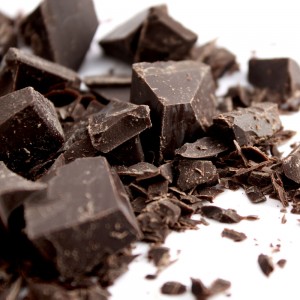By Anthoney J. Andersen – Steroidal.com
When you think of foods that are beneficial to your health, the last thing that probably comes to mind is candy – especially chocolate.
Now, whether you’re a fitness/nutrition enthusiast, the one thing to know is that it’s perfectly normal to indulge in your favorite sugary treats every once in awhile, as long as it’s done in moderation.
So, for all you chocolate lovers out there, you’ll be glad to know that consuming small quantities of dark chocolate can actually provide a number of healthy benefits for your body.
FIRST THING’S FIRST: WATCHING YOUR CALORIC INTAKE
Whether you’re trying to lose weight, gain weight, or simply maintain your current weight, keeping an eye on your daily caloric intake is vital to achieving your goal.
But how many calories are you supposed to consume each day?
The answer to that question depends on many factors – including age, gender, and activity level. According to WebMD, the following chart should only be used as a reference point, due to the fact that each person has a completely different metabolic rate, even if they’re the same height and gender.
 To maintain weight: The chart below shows your daily calorie limit, based on your BMI (body-mass index), which is 21.5 for women and 22.5 for men.
To maintain weight: The chart below shows your daily calorie limit, based on your BMI (body-mass index), which is 21.5 for women and 22.5 for men.
To lose weight: About one pound per week, it’s recommended that you reduce your total calories in the chart by 500 a day.
To gain weight: Add 500 calories per day for each pound you want to gain per week.
For successful weight loss that can be sustained over time, experts recommend choosing a diet/foods that are low in calories, but high in protein, vitamins, fiber, and other nutrients (like carbohydrates and healthy fats).
| Gender | Age | Slightly Active | Moderately Active | Active |
| Females | 19-30 | 1800-2000 | 2000-2200 | 2400 |
| 31-50 | 1800 | 2000 | 2200 | |
| 51+ | 1600 | 1800 | 2000-2200 | |
| Men | 19-30 | 2400-2600 | 2600-2800 | 3000 |
| 31-50 | 2200-2400 | 2400-2600 | 2800-3000 | |
| 51+ | 2000-2200 | 2200-2400 | 2400-2800 |
Watching your caloric intake becomes important because – even though dark chocolate provides many health benefits – it’s also high in calories and fat.
WHAT IS CHOCOLATE?
Using beans harvested from the cocoa tree – “Theobroma Cacao,” produces chocolate. The beans are removed from their pod, fermented, fried, roasted, and then ground to produce a cocoa mass or cocoa liquor – which can also be combined with sugar, vanilla and cocoa butter to make chocolate.
WHY DARK CHOCOLATE?
According to Fitday.com, consuming small amounts of dark chocolate two to three times each week, can help lower your blood pressure, which will reduce your risk for heart disease or stroke.
Blood pressure falls into four categories, ranging from normal, to stage two high blood pressure (hypertension). The following is a general breakdown of the categories, followed by solutions to help lower your blood pressure:
| Top number (systolic) | Bottom number (diastolic) | Your Category | What to do |
| Below 120 | Below 80 | Normal blood pressure | Maintain or adopt a healthy lifestyle. |
| Between 120-139 | Between 80-89 | Prehypertension | Maintain or adopt a healthy lifestyle. |
| Between 140-159 | Between 90-99 | Stage 1 hypertension | Maintain or adopt a healthy lifestyle. If your blood pressure doesn’t improve within a month, consult your physician about taking one or more medications. |
| 160 or higher | 100 or higher | Stage 2 hypertension | Maintain or adopt a healthy lifestyle. Talk to your physician about taking one or more medications. |
As you can see, maintaining a healthy blood pressure is a vital part to sustaining a long and healthy life. Eating a moderate amount of dark chocolate will help improve blood flow and may help prevent the formation of blood clots, as well as arteriosclerosis (hardening of the arteries).
According to the University of Michigan Health System, dark chocolate also contains flavonoids – a group of antioxidants known as polyphenols, which are found in a variety of foods, including dark chocolate, tea, red wine, and various fruits and vegetables.
Examples of antioxidants are beta-carotene, lycopene, selenium, vitamin A, vitamin C, and vitamin E. Antioxidants have been known to prevent or delay certain types of cell damage.
According to the National Center for Biotechnology Information, the cocoa in dark chocolate can also be beneficial on cholesterol levels because it consists mainly of stearic and oleic acid. Stearic acid is a saturated fat – but unlike most saturated fatty acids – it does not raise blood cholesterol levels.
Oleic acid – a monounsaturated fat – does not raise cholesterol levels, and may even help reduce it.
Regular intake of dark chocolate can also help improve a person’s mood by boosting serotonin and endorphin levels in the brain.
As mentioned before, dark chocolate is also high in certain vitamins and minerals:
According to Fitday.com, the copper and potassium in dark chocolate helps prevent against stroke and cardiovascular ailments. The iron in chocolate helps stave off the iron deficiency anemia, while the magnesium helps prevent type 2 diabetes, high blood pressure and heart disease.
CONCLUSION
As you can see, some of the “unhealthy” foods can provide a plethora of health benefits. When is comes to a well-balanced diet, you don’t have to completely eliminate all sweets and sugars, just as long as you’re consuming them in moderation (a few times a week).
Just keep in mind that even though dark chocolate can have rewarding effects on your overall health, it can also cause severe health problems if not properly regulated.
Less is more.







